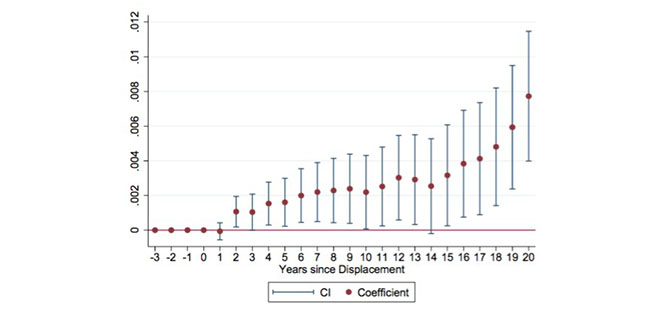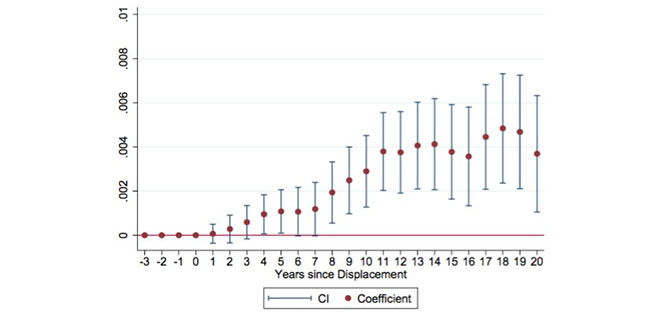Study: Job displacement increases mortality risk

Job displacement because of a plant closure substantially increases the mortality risk of the displaced workers and their partners. This is the conclusion presented in a recent study on employees laid off during the 1990s recession and their families.

According to a recent study by Christina Gathmann, Kristiina Huttunen, Laura Jernström, Lauri Sääksvuori and Robin Stitzing, the layoffs resulting from plant closures during the 1990s recession had long-term impacts on the mortality of the displaced workers and on the income of their families.
The earnings of the displaced workers do not return to the levels of the control group during their subsequent careers, even if they were re-employed. Displacement substantially increases the mortality risk of the displaced workers (Chart 1) and their partners (Chart 2) and the effects of the displacement on mortality are present throughout the 20-year monitoring period.
 Figure 1. Effect of male displacement on one’s own mortality.
Figure 1. Effect of male displacement on one’s own mortality.

Figure 2. Effect of male displacement on partner’s mortality.
The effect is particularly substantial when the displaced worker is a male. According to the study, for every 10,000 displaced men, there are 27 additional deaths during a period of five years when consideration is given to the higher mortality risk among the displaced workers and their partners. Twenty years after job displacement, excess mortality is put at 115 additional deaths per 10,000 displaced workers.
– The costs of layoffs should not only be measured in terms of money but in many cases also in terms of human lives, explains Research Professor Kristiina Huttunen.
Research report:
Christina Gathmann, Kristiina Huttunen, Laura Jernström, Robin Stitzing ja Lauri Sääksvuori:Job Loss and Health Spillovers in the Family.
http://urn.fi/URN:ISBN:978-952-274-256-8
Kristiina Huttunen
Income distribution and inequality
Labour markets
Local public finance and provision of public services
Press release
Press release
Uutiset ja tiedotteet
employment
unemployment

